https://www.austinchronicle.com/music/1998-09-11/520237/
Texas Platters
September 11, 1998, Music
Junior Brown
Long Walk Back (Curb)
While taken as a whole Long Walk Back is somewhat unsatisfying, there are some mighty special moments sprinkled throughout to make Junior Brown's latest a worthwhile listen. Brown's audience is comprised of those country music fans who appreciate his decidedly retro songs with a humorous edge and guitar players who are constantly amazed at what he does rather nonchalantly with his unique instrument, the guit-steel. Long Walk Back is likely to please both camps as it deftly straddles the path he's taken by including songs like the super shuffle "Long Walk Back to San Antone" and the oh-so-twangy "All Fired Up" next to the wacky romp "Rock-A-Hula Baby" and the serious extended guitar workout of "Stupid Blues." The latter tune, the most overt homage to Jimi Hendrix that Brown has ever recorded, features Experience drummer Mitch Mitchell in a nice piece of musical matchmaking. Brown's fretwork has rarely sounded so enthusiastic and daring, with squeals and multi-note runs interspersed with thoughtfully placed solos. While treading on familiar territory, Long Walk Back also indicates Brown isn't afraid to take some chances and it's a keeper.
3 Stars --Jim Caligiuri
Willie Nelson
Teatro (Island)
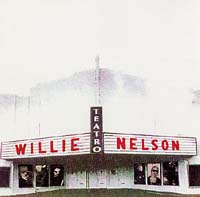 After all the hype proclaiming Willie Nelson and Daniel Lanois the year's most provocative pairing, turns out the hyperbole reads better in the credits than it sounds on the album. Since songs, not producers, made Nelson a legitimate legend in the first place, however, Teatro still succeeds more often than not -- almost in spite of Lanois' everything-but-the-kitchen-sink clutter. In fact, other than inviting Emmylou Harris to sing on 11 of Teatro's 14 tracks, Lanios' singular accomplishment lies in how well his signature tune, "The Maker," holds up against a combined set of older Nelson tunes and a batch of new Spirit-style tunes so stunning they would have been just as moody and atmospheric with or without Lanois. Teatro's most poignant moment, then -- a straight reading of Nelson's '66 classic "I Just Can't Let You Say Goodbye" -- is also Lanois' most restrained. Here, Emmylou Harris' shadow harmonies and Bobbie Nelson's slow Wurlizter whirl not only set up Willie's best Teatro guitar solo, but also the tune's frisky finale: Nelson's casual observation that, "The flesh around your throat is pale/indented by my fingernails." For once, there are no big drums, splashy rhythm changes, or slick vibraphones -- just a great singer leading a great band though a great song. Unfortunately, just a little more of that simplicity and a lot less of Lanois could have made Teatro less provocative and more compelling.
After all the hype proclaiming Willie Nelson and Daniel Lanois the year's most provocative pairing, turns out the hyperbole reads better in the credits than it sounds on the album. Since songs, not producers, made Nelson a legitimate legend in the first place, however, Teatro still succeeds more often than not -- almost in spite of Lanois' everything-but-the-kitchen-sink clutter. In fact, other than inviting Emmylou Harris to sing on 11 of Teatro's 14 tracks, Lanios' singular accomplishment lies in how well his signature tune, "The Maker," holds up against a combined set of older Nelson tunes and a batch of new Spirit-style tunes so stunning they would have been just as moody and atmospheric with or without Lanois. Teatro's most poignant moment, then -- a straight reading of Nelson's '66 classic "I Just Can't Let You Say Goodbye" -- is also Lanois' most restrained. Here, Emmylou Harris' shadow harmonies and Bobbie Nelson's slow Wurlizter whirl not only set up Willie's best Teatro guitar solo, but also the tune's frisky finale: Nelson's casual observation that, "The flesh around your throat is pale/indented by my fingernails." For once, there are no big drums, splashy rhythm changes, or slick vibraphones -- just a great singer leading a great band though a great song. Unfortunately, just a little more of that simplicity and a lot less of Lanois could have made Teatro less provocative and more compelling.
3 Stars --Andy Langer
Electromagnets
(Rhino)
Eric Johnson should have made this album 20 years ago. Or rather, Austin's favorite Stratocaster son should have been making this album for 20 years. Recorded in 1974 when Johnson was 19-20, the Electromagnets' sole release (original pressing: 4,000 copies) not only features the guitarist's most furious and uncompromising fret-work, it easily outscorches any and all of his three solo efforts. Perhaps because this jazz/rock "fusion" band was actually drummer Bill Maddox and electric pianist Steve Barber's long-running experiment (bassist Kyle Brock rounding out the quartet), Johnson was free to just cut loose, which he does in grand style. Lead-off cut "Hawaiian Punch," every bit the blast its title implies, the burning "Dry Ice," and searing live bonus tracks of both tunes, illustrate Johnson's prodigious talents like no other compositions in his catalog. And though Electromagnets suffers from no small amount of New Age noodling ("Motion," "Nova Scotia"), the flighty "Salem" featuring vocals by one young Chris Geppert (aka Christopher Cross), the overall dynamic, remixed into the Nineties by Richard Mullen, is light years removed from the aesthete of its day, "progressive country." Rather, it's what Joe Nick Patoski terms in his typically smart then-and-now liner notes "intellectual heavy metal music."
3.5 Stars --Raoul Hernandez
The Edwin Livingston Group
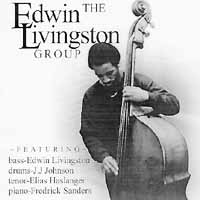 In his first recording as session leader, Edwin Livingston, one of Austin's premiere jazz bassists, has reached out for a sound all his own, and with the help of four original compositions and one extended improvisation, he's pushed the envelope a bit. The bass solo in the first tune, "AKA Fiddy Jones," is all over the place, taking high thin to reverbing lows, Livingston hitting quick eighths and sixteenths at all points in between as if he had three hands. The soloing is loose in "Shytown," taking a nod from the sparse jamming style of Charlie Haden in a small combo, while "Hattie-n-James" changes step with a nasty stroll through some bluesy jazz, Livingston's bowing heightening the swagger. And, as is to be expected by now, he gets some heavyweight performances out of his longtime comrades. Elias Haslanger's sax work is impeccable -- adventurous and inspired -- while Fred Sanders' piano is likewise free-roaming. Drummer J.J. Johnson and Livingston fit like a tight handshake, always in tune with who has the time. This is more than a solid first effort -- it's an exciting taste of things to come.
In his first recording as session leader, Edwin Livingston, one of Austin's premiere jazz bassists, has reached out for a sound all his own, and with the help of four original compositions and one extended improvisation, he's pushed the envelope a bit. The bass solo in the first tune, "AKA Fiddy Jones," is all over the place, taking high thin to reverbing lows, Livingston hitting quick eighths and sixteenths at all points in between as if he had three hands. The soloing is loose in "Shytown," taking a nod from the sparse jamming style of Charlie Haden in a small combo, while "Hattie-n-James" changes step with a nasty stroll through some bluesy jazz, Livingston's bowing heightening the swagger. And, as is to be expected by now, he gets some heavyweight performances out of his longtime comrades. Elias Haslanger's sax work is impeccable -- adventurous and inspired -- while Fred Sanders' piano is likewise free-roaming. Drummer J.J. Johnson and Livingston fit like a tight handshake, always in tune with who has the time. This is more than a solid first effort -- it's an exciting taste of things to come.
3.5 Stars --Christopher Hess
FRED MITCHIM
Fire Thinks of Water (Zombo)
THE LOCAL GROUP
The Process of Making Light (Zombo)
Fred Mitchim is a local musician known for poetic song and album titles, such as I Catch Birds for the Queen of the Night. And his two new releases, one under his own name, and one with the bland but amusingly named The Local Group, keep this tradition of interesting nomenclature alive. What's behind the names? The shorter of the two and only loooong songs on Fire Thinks of Water (the two songs total over 50 minutes), the title track, finds Mitchim singing with inflections like Michael Hedges -- a preachy Michael Hedges. And it doesn't help that the song moves rhythmically from being interestingly offbeat to disjointedly off-kilter. In contrast, the opening track, "Down Black River," with its wide tonal pallet, paints a similar picture to the one brushed by Rush in "Xanadu." The song then morphs into a dreamy segment not unlike the Beatles' "Tomorrow Never Knows," making it clear that Mitchim knows how to orchestrate and arrange sounds. The Local Group's The Process of Making Light finds Mitchim in a tighter, band context. Timewise, the seven songs don't top 40 minutes, so the Local Group's effort is slightly more accessible, such as the intrapersonal lyrics churned with a cynical beat on "Sure Thing." The visible reference to the title of The Process of Making Light is the cover picture's galaxy close-ups. The musical reference is the title track, with its interstellar ja-hazzy main line cushioned by percolating rhythms, and replete with a backward-starting, hyped-up, "Maggot Brain"-esque guitar solo. Sometimes though, the songs drop out of orbit, or in the case of "Love Town" never quite take off. A pleasant intergalactic trip nonetheless.
(Both) 2.5 Stars --David Lynch
Pocket FishRmen
Simian Dreams (Enhanced)
"Wow! What is this? I really like it a lot!" bubbled the pretty young intern as she ran breathlessly into the music offices of the Chronicle to discover the Pocket FishRmen's new CD Simian Dreams in the boombox. I didn't ask if she'd been listening to the words -- I really didn't want to know. Yep, the FishRmen continue to have a miraculous way with a pop-punk-thrash-Kiss melodies, with a distinct style that comes just shy of making each album sound the same, but it's the longtime local band's lyrics -- some insist that calling them "juvenile" would be a compliment -- that lead many would-be fans to dismiss them outright. I've always had a soft spot in my head for these guys, though. After all, they left "over the top" behind in the dust years ago. If they did a song about sex acts with a gorilla, well, that'd just be stupid. Simian Dreams, then, boasts no less than four! And there's a solid three more with the word "merkin" in the title! Do you see where I'm going with this? There's no way the FishRmen could be as stupid as they sound, so I'm betting that one day, we'll be able to decipher secret messages in their songs that will lead us to world peace, space colonization, and eternal life. They just don't think we're ready for it yet.
3 Stars --Ken Lieck
Transona Five
Duffel Bag (Sandwich)
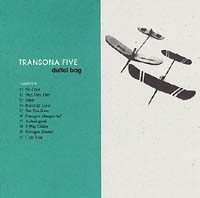 The delicate, hypnotic waltz played on a single guitar that floats you into the opening song on Duffel Bag, the first full-length from Denton's Transona Five, is a promise. "No Door" promises that for the next 10 songs, you'll be in a place more peaceful and more beautiful than the normal world you occupy. Through a consistent wash of shimmery keyboards and a soft touch on guitar and drums, the band keeps the promise and goes further than that, expanding on the sound they formed with their outstanding EP from last year, Melatonin Bullet. This time around, they add some goofy French ditty about fromage ("Pourquoi Manges-tu?"), extended synthesized melodies enhanced by guitar/keyboard player Rachel Smith ("Recorder Loop"), and to the extent that's possible, a rolling guitar jam ("Estrogen Blaster"). The band's strength is in their divinely sleepy, melodic songs, which lope along repetitively, building and thickening each tune with every roll -- as on "Hey, Hey, Hey," "Stair," and especially "Coin Toss." Plenty of this mood candy in this Duffel Bag.
The delicate, hypnotic waltz played on a single guitar that floats you into the opening song on Duffel Bag, the first full-length from Denton's Transona Five, is a promise. "No Door" promises that for the next 10 songs, you'll be in a place more peaceful and more beautiful than the normal world you occupy. Through a consistent wash of shimmery keyboards and a soft touch on guitar and drums, the band keeps the promise and goes further than that, expanding on the sound they formed with their outstanding EP from last year, Melatonin Bullet. This time around, they add some goofy French ditty about fromage ("Pourquoi Manges-tu?"), extended synthesized melodies enhanced by guitar/keyboard player Rachel Smith ("Recorder Loop"), and to the extent that's possible, a rolling guitar jam ("Estrogen Blaster"). The band's strength is in their divinely sleepy, melodic songs, which lope along repetitively, building and thickening each tune with every roll -- as on "Hey, Hey, Hey," "Stair," and especially "Coin Toss." Plenty of this mood candy in this Duffel Bag.
3.5 Stars --Christopher Hess
Mineral
EndSerenading (crank!)
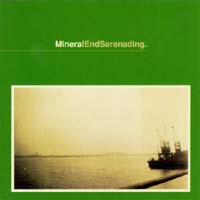 EndSerenading, the indie swan song from Austin's Mineral, spends much of its time skirting between heavy melody and just plain dissonance with guitarists Christopher Simpson and Scott McCarver constantly weaving single-note lines around each other. The bulk of it, then, comes off like Henry Rollins meets Lullaby for the Working Class alternating with the more ethereal moments of Swervedriver. Unfortunately, the album lacks intensity, whether overt or understated, of Rollins and Lullaby respectively, or Swervedriver's knack for texture. As a result, aside from standouts like "Palisade" and "ForIvadell," EndSerenading is more lethargic than hypnotic or dynamic. And when the band builds from its loose meandering sound to big pay-off explosions, as in "Walking to Winter" and "Gjs," the catharsis is so long in coming that it's almost ineffectual. That's the general architecture of much of this album: start off discordant, slowly pick it up, then end rocking. If only Mineral would spend a little less time before bringing the rock, EndSerenading would be much easier to dig.
EndSerenading, the indie swan song from Austin's Mineral, spends much of its time skirting between heavy melody and just plain dissonance with guitarists Christopher Simpson and Scott McCarver constantly weaving single-note lines around each other. The bulk of it, then, comes off like Henry Rollins meets Lullaby for the Working Class alternating with the more ethereal moments of Swervedriver. Unfortunately, the album lacks intensity, whether overt or understated, of Rollins and Lullaby respectively, or Swervedriver's knack for texture. As a result, aside from standouts like "Palisade" and "ForIvadell," EndSerenading is more lethargic than hypnotic or dynamic. And when the band builds from its loose meandering sound to big pay-off explosions, as in "Walking to Winter" and "Gjs," the catharsis is so long in coming that it's almost ineffectual. That's the general architecture of much of this album: start off discordant, slowly pick it up, then end rocking. If only Mineral would spend a little less time before bringing the rock, EndSerenading would be much easier to dig.
2 Stars --Michael Bertin
Transfixr
tincture
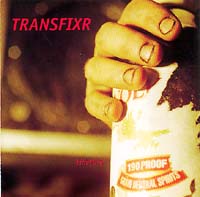 Unintelligible lyrics screamed under the mix, violent, mostly instrumental progressive poundings all lost in Hellraiser-like labyrinths, and no discernable songs. And it works! Mostly. A trio of local thrashers, Transfixr's tincture might be muddy brown, but then said idiom always called for a similarly shaded mix. Propulsion is all that's required of thrash, and as long as the throbbing, often choppy music delves ever further into its own dark depths, nothing else matters. Transfixr have it down. In fact, despite the minor detail that all 12 of this scary debut's songs morph into one another like a series of nightmares, tincture's 48-minute running time passes quicker than you could pull out your own entrails. Sure, it might improve things if one could make out the occasional vocal writhing, like "Glass Packed" ("shut yer fucking mouth"), but with this kind of abuse, one gets the general idea. In the upper right-hand corner of the back insert, off-set from the song titles, is stamped an inconspicuous "nc17." Does this mean that even accompanied by a parent or guardian tincture is unsuitable for children under 17? You bet your squeamish little heart it does.
Unintelligible lyrics screamed under the mix, violent, mostly instrumental progressive poundings all lost in Hellraiser-like labyrinths, and no discernable songs. And it works! Mostly. A trio of local thrashers, Transfixr's tincture might be muddy brown, but then said idiom always called for a similarly shaded mix. Propulsion is all that's required of thrash, and as long as the throbbing, often choppy music delves ever further into its own dark depths, nothing else matters. Transfixr have it down. In fact, despite the minor detail that all 12 of this scary debut's songs morph into one another like a series of nightmares, tincture's 48-minute running time passes quicker than you could pull out your own entrails. Sure, it might improve things if one could make out the occasional vocal writhing, like "Glass Packed" ("shut yer fucking mouth"), but with this kind of abuse, one gets the general idea. In the upper right-hand corner of the back insert, off-set from the song titles, is stamped an inconspicuous "nc17." Does this mean that even accompanied by a parent or guardian tincture is unsuitable for children under 17? You bet your squeamish little heart it does.
2.5 Stars --Raoul Hernandez
SEASON TO SLAVES
Conductor (Revolution Music)
The Good and the Bad. That's the skinny on Conductor, the latest from Season to Slaves, a local trio that often plays at Steamboat and Stubb's. For example, some of the introductory fretless bass notes slightly miss the mark in "Slave Trade," but the tune also features a nice cameo by Heather Bishop on viola. Likewise, "I Will Run" possesses a fine post-climax windup, but a harmonica fly-by that drops the song's intensity prematurely down. Die Gut und die Schlecht. One on hand, "New Heavy" has more Ian Moore-inflected "ye-ah"s than any song should legally contain, but on the other hand, the KLBJ-friendly riff from "Cradle Song" is a bottomless cup of chunk. Le bien et le mal. The album's last song is propelled by a deep space intro groove vaguely tinctured with Arabesque singing, and while worth mentioning, its not being listed in the liner notes precludes that. Which also means that all of the above-named song titles could be wrong too. El bueno y el mal.
2 Stars --David Lynch
7 Stones
Blue Chemicals (Flywheel)
Longtime stone-cutters at Sixth Street's rock & roll castle, Steamboat, Austin's 7 Stones hammer out post-Soundgarden hard rock like KLBJ quarrymen. Sounding a little like Living Colour's Corey Glover, vocalist Ray Prim imbues the local quintet's building, bashing hard rock with enough soul to counterbalance the well-woven guitar interplay of axemen Jayde S. and Tate Farrar. Producer Jim Wilson's big budget-sounding production gives the music enough separation so that everything falls into place -- everything but the songwriting. While the opener "Breathe Again" promises big things like fat hooks, ample riffage, and better-than-average lyrics, the three fail to come together on this full-length debut's other seven tracks the way they do on the instantly memorable second cut, "Restraint." With its ultra catchy "bright lights, dumb metaphors" refrain, this song alone shows what the hard-working 7 Stones is capable of. Now, boys, carve out seven more like it, and let's see then what ye hath wrought.
2 Stars --Raoul Hernandez
South Austin Kicks Ass
(High on the Hog)
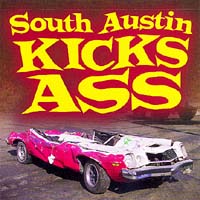 You know this town's getting too big for its britches when local punk rock compilations start getting this provincial. What's next? Delwood Duplex Nation Rocks? All kidding aside, this slab works because it conjures up the atmosphere of a bring-your-own-meat barbeque where everybody gets stewed to the gills on Bear Whiz Beer. That may not be all there is to South Austin, but 12 ugly, reckless, and fun local bands sounds like a caucus to me. South Austin Kicks Ass leads off with Jesus Christ Superfly's one-two punch, "Nervous" and "White Trash Muthafucker." Boomland's "Go Back to California" will surely resonate with the displaced low-rent crowd, while Horseshit Gunfire's "Don't Know You" serves up a slurred-n-blurred take on Duane Eddy. Pulling double duty in Voltage and Squat Thrust, Jimmy Bradshaw emerges as South Austin's guitar antihero, fist-pumping anthems like the latter band's "Keg Party at the Lake" luxuriating in the amorality of Seventies cock rock with a wink and a nod. This well-honed vision closes with Los Soulbenders' aggravated and unrelenting cover of "Is Anybody Goin' to San Antone?" If these people live in your neighborhood, start taping egg cartons to the walls. Resistance is futile.
You know this town's getting too big for its britches when local punk rock compilations start getting this provincial. What's next? Delwood Duplex Nation Rocks? All kidding aside, this slab works because it conjures up the atmosphere of a bring-your-own-meat barbeque where everybody gets stewed to the gills on Bear Whiz Beer. That may not be all there is to South Austin, but 12 ugly, reckless, and fun local bands sounds like a caucus to me. South Austin Kicks Ass leads off with Jesus Christ Superfly's one-two punch, "Nervous" and "White Trash Muthafucker." Boomland's "Go Back to California" will surely resonate with the displaced low-rent crowd, while Horseshit Gunfire's "Don't Know You" serves up a slurred-n-blurred take on Duane Eddy. Pulling double duty in Voltage and Squat Thrust, Jimmy Bradshaw emerges as South Austin's guitar antihero, fist-pumping anthems like the latter band's "Keg Party at the Lake" luxuriating in the amorality of Seventies cock rock with a wink and a nod. This well-honed vision closes with Los Soulbenders' aggravated and unrelenting cover of "Is Anybody Goin' to San Antone?" If these people live in your neighborhood, start taping egg cartons to the walls. Resistance is futile.
3 Stars --Greg Beets
The Shakin' Apostles
Medicine Show (Big Tex)
As chief songsmith for the Shakin' Apostles, Freddie Steady Krc ruminates about a time long past: Medicine Show presents tunes about family bands, frontier opera, and buffalo slaughter. Couple this with a broad musical variety -- the album traipses across several different genres, from rock to rag to gunfighter ballad -- and it seems a good formula. Unfortunately, Medicine Show falls short of its aim, hobbled by moments of overproduction and lead vocals leaning towards the wan. The first few numbers are indicative of the problem: The titular "Medicine Show" tries to lay claim to the mantle of Texas rock & roll, but winds up sounding like warmed over ZZ Top, while "Crazy Flowers" sounds suspiciously like something from a Chris DeBurgh album. Things get better from there, but it's evident that Freddie Krc's songs have more muscle than his voice, and it's hard not to think that these tunes would sound better if sung by, say, Billy Gibbons. Give the Apostles credit for mixing it up a bit, for laying down a good tune or two -- for using the words "hurdy-gurdy girls" -- but in the end, Medicine Show has more ambition than reach.
2 Stars --Jay Hardwig
Seth Walker
When it Rains it Pours
With many of his contemporaries espousing the joys of the big bands, Seth Walker swings the other way, if you will. When It Rains It Pours skips down a somewhat less-traveled road, that of Gulf Coast blues/swing, making it a little more Texan, but no less danceable. With a back-up combo featuring keys man Floyd Domino, bassist Larry Eisenberg, drummer Frosty, and Kaz Kazanoff and Chris Womack on sax, you'd think it would be tough to make a misstep, and you'd be right, actually. Still, considering that this album consists of 90% original material, the sole exception being Tiny Grimes'"Tiny's Tempo," all the talent in the world couldn't pull it off if Walker didn't know his territory well. Suffice to say he does pull it off. Now pull on your dancing shoes.
3 Stars --Ken Lieck
Marti Brom & Her Jet Tone Boys
Mean! (Squarebird)
You don't have to be an old-timer to realize that there's something comforting in the pop and hiss of a needle hitting spinning vinyl, that there's something good and glorious about a fine ol' 45. Austin's raucous rockabilly queen Marti Brom must feel the same way since her latest batch of songs comes in a box set of four 45s. The title tells you right off that Brom is selling more than nostalgia -- she's selling attitude. And there's plenty of both on these analog anachronisms. The box o' singles opens with a lively take on Ralph Stanley's "Latch On," but it's the B-side that really shines: "Wicked White Lies," a Brom original, is a cruel country heartbreaker as bitter as it is blue. Side after side, Brom makes it clear that she's as liable to pick up a rolling pin as ask for a li'l kiss, and you'd best know the difference. A solid set, 20 minutes worth when all is said and done, and if you took $3 for your record player at a yard sale five years ago, don't worry; Mean! includes a (gasp!) digitally remastered compact disc of the same eight songs.
3 Stars --Jay Hardwig
Mary Cutrufello
When the Night Is Through (Mercury)
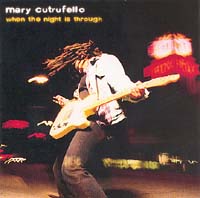 Once upon a time, debut albums weren't make-or-break, they were just the first step in a career. First and foremost, they were about establishing identities, and if a few great songs happened to brush up against the learning curve, nobody complained. In that regard, Mary Cutrufello's major label debut serves her dreams of a rock crossover well. With plenty of aching vocals, gritty guitar, and sing-a-long choruses, the Houston-based guitar-slinger establishes herself as an unabashed rock & roll throwback -- someone who might yet satisfy all those folks who were too smart to accept Melissa Etheridge or Sheryl Crow as substitutes. Unfortunately, all that hope comes wrapped in a wholly inconsistent, badly produced, and fairly unimaginative album that relies more on instincts than craftsmanship. Worse, Cutrufello often finds herself scrambling to save an underwritten tune with breathy theatrics. The exceptions, most notably the Stonesish "Miss You #3" and "Tired and Thirty," an epic power ballad that showcases the hard-worn twang only her Texas fans know to expect, convey far more confidence than most major label freshman seem capable of mustering. Let's hope Mercury delivers its oft-promised serious career development and that this really is only a debut, because while it's obvious that this isn't a great album, it's also apparent Mary Cutrufello may only be a couple of albums off.
Once upon a time, debut albums weren't make-or-break, they were just the first step in a career. First and foremost, they were about establishing identities, and if a few great songs happened to brush up against the learning curve, nobody complained. In that regard, Mary Cutrufello's major label debut serves her dreams of a rock crossover well. With plenty of aching vocals, gritty guitar, and sing-a-long choruses, the Houston-based guitar-slinger establishes herself as an unabashed rock & roll throwback -- someone who might yet satisfy all those folks who were too smart to accept Melissa Etheridge or Sheryl Crow as substitutes. Unfortunately, all that hope comes wrapped in a wholly inconsistent, badly produced, and fairly unimaginative album that relies more on instincts than craftsmanship. Worse, Cutrufello often finds herself scrambling to save an underwritten tune with breathy theatrics. The exceptions, most notably the Stonesish "Miss You #3" and "Tired and Thirty," an epic power ballad that showcases the hard-worn twang only her Texas fans know to expect, convey far more confidence than most major label freshman seem capable of mustering. Let's hope Mercury delivers its oft-promised serious career development and that this really is only a debut, because while it's obvious that this isn't a great album, it's also apparent Mary Cutrufello may only be a couple of albums off.
2 Stars --Andy Langer
Zuckerman Electric
Double Dam
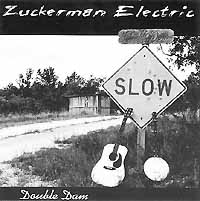 The raw, unfiltered sound of Double Dam, recorded over a weekend at the studio of the same name, while lending a gritty element to the down and dirty moments, often masks the incondite vision of the compositions. More often than not, the songs turn from artsy roots music to pop in disguise, like the rote "Midwestern Gals" and the insipid "Matchmaker." And though not bad in itself, this shift can be cause for anger, because when it happens -- when the lyrics turn to doo-wop style clichés or when bassist Patrick Pestorius' vocals jump to a grating falsetto -- it nearly always ruins a song that otherwise seemed headed somewhere fun. There's some great string work on this album, from Zuckerman's formidable guitar playing on both electric and acoustic to Thomas van der Brook's often rousing fiddle parts (like on "Crazy Cocaine Mary"). All too often, though, so many left turns occur that the song becomes irretrievably lost. Double Dam certainly has its good points ("Alligator Boots") as well as its bad (again, "Matchmaker"), and in this at least, it's consistent.
The raw, unfiltered sound of Double Dam, recorded over a weekend at the studio of the same name, while lending a gritty element to the down and dirty moments, often masks the incondite vision of the compositions. More often than not, the songs turn from artsy roots music to pop in disguise, like the rote "Midwestern Gals" and the insipid "Matchmaker." And though not bad in itself, this shift can be cause for anger, because when it happens -- when the lyrics turn to doo-wop style clichés or when bassist Patrick Pestorius' vocals jump to a grating falsetto -- it nearly always ruins a song that otherwise seemed headed somewhere fun. There's some great string work on this album, from Zuckerman's formidable guitar playing on both electric and acoustic to Thomas van der Brook's often rousing fiddle parts (like on "Crazy Cocaine Mary"). All too often, though, so many left turns occur that the song becomes irretrievably lost. Double Dam certainly has its good points ("Alligator Boots") as well as its bad (again, "Matchmaker"), and in this at least, it's consistent.
2 Stars --Christopher Hess
The Gourds
gogitchyershinebox (Watermelon)
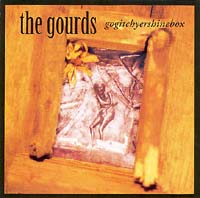 The Gourds' gogitchyershinebox will probably go down as the only release ever to thank Dr. Dre, Snoop Dogg, and Doc Watson in the same set of liner notes. The 8-song EP features a couple of covers and a handful of live tracks culled mostly from Stadium Blitzer, the full-length album the band put out earlier this year. Where most EPs are usually singles with a couple of other unreleased tracks (read: material not good enough to make the album), this little collection may be a genius way for the uninitiated to get in to Austin's wildly popular mountain music act. Up front, the hillbilly hellraisers put two non-threatening and seriously unconventional covers: one of the classic rock staples, "Ziggy Stardust" (funny, they didn't thank David Bowie), the other, Snoop's "Gin and Juice." The latter is an absolutely ingenious union of redneck roots and rap, and a must for homeboys as well as hicks. After those two numbers, and the slightly electric revamp of "Magnolia," the more traditional-sounding material, from a live recording in the Netherlands, is an easy sell.
The Gourds' gogitchyershinebox will probably go down as the only release ever to thank Dr. Dre, Snoop Dogg, and Doc Watson in the same set of liner notes. The 8-song EP features a couple of covers and a handful of live tracks culled mostly from Stadium Blitzer, the full-length album the band put out earlier this year. Where most EPs are usually singles with a couple of other unreleased tracks (read: material not good enough to make the album), this little collection may be a genius way for the uninitiated to get in to Austin's wildly popular mountain music act. Up front, the hillbilly hellraisers put two non-threatening and seriously unconventional covers: one of the classic rock staples, "Ziggy Stardust" (funny, they didn't thank David Bowie), the other, Snoop's "Gin and Juice." The latter is an absolutely ingenious union of redneck roots and rap, and a must for homeboys as well as hicks. After those two numbers, and the slightly electric revamp of "Magnolia," the more traditional-sounding material, from a live recording in the Netherlands, is an easy sell.
3 Stars --Michael Bertin
TUNJI
Last Night's Wine (Open Lane)
 Why doesn't Last Night's Wine buzz as hard as Tunji's jam-jazz-r&b-rock live performances? Not because the local quintet isn't full of funk; both "Lush Life Lane" and the postmodern Great Gatsby feeling of "Pink" disprove that. And it's not because the band didn't use their studio environs to spread out creatively, four guest horns packing such punch that Tunji should seriously consider having them onstage for the next gig. And it's certainly not the sound, because this debut is a better-than-average recording and production effort. No, it's because the band is simply a better live band. That's not to say they can't lay it down on tape, yet with the exception of "Piss Poor Trade Off," which tries being too many things (including a tribute/steal of Bob Marley's "No Woman, No Cry"), virtually all eight of the album's original tunes could be stretched out and developed more. Just as the band does onstage. Maybe it's time to record that headlining slot?
Why doesn't Last Night's Wine buzz as hard as Tunji's jam-jazz-r&b-rock live performances? Not because the local quintet isn't full of funk; both "Lush Life Lane" and the postmodern Great Gatsby feeling of "Pink" disprove that. And it's not because the band didn't use their studio environs to spread out creatively, four guest horns packing such punch that Tunji should seriously consider having them onstage for the next gig. And it's certainly not the sound, because this debut is a better-than-average recording and production effort. No, it's because the band is simply a better live band. That's not to say they can't lay it down on tape, yet with the exception of "Piss Poor Trade Off," which tries being too many things (including a tribute/steal of Bob Marley's "No Woman, No Cry"), virtually all eight of the album's original tunes could be stretched out and developed more. Just as the band does onstage. Maybe it's time to record that headlining slot?
2 Stars --David Lynch
MARMALADE
This is what happens when bands put out a CD before they're ready. Marmalade has a few decent ideas that might work wonders on the black shirt contingent of alterna-rock, but they execute these ideas with all the subtlety of a slaughterhouse. Passages calling for restraint are overbearing, with a song like "It's Her Life" starting out as a promising empathetic ballad before inexplicably barreling into a badly misplaced boogie-woogie chorus. Leave Jim Dandy back in Arkansas where he belongs. "Pull" features airy pop vocals being snuffed out by a thick, distorted guitar attack. What the hell? This omnipresent effect saturation compromises everything in its path, the overall sound being what you might expect from a jambox stuffed under a mattress in a musty practice space. Speaking of, a little woodshedding might be just the tonic Marmalade needs to do itself sonic justice.
1.5 Stars --Greg Beets
Blue Cartoon
(Aardvark)
Opening their debut with a misstep -- one of those fake "searching the dial" intros that's clumsy, unoriginal, and doesn't lead into the first song well -- Blue Cartoon quickly recover as their "Parachute" opens the set proper; it's relaxed but encouraging pop about what you expect ("I will be your parachute..."). Engaging melodies continue throughout this local release, and while you have to give high scores to each individual tune, unfortunately the album ends up suffering from sameness. The Beach Boys-like harmonies of "Best Laid Plans," hints of James Bond guitar in "How Many Times," and occasional keyboard flourishes from Austin-based pop svengali/producer Ron Flynt of 20/20 give the listener a little poke now and then, but overall, Blue Cartoon is pining for an uptempo number or two. I mean, who would have thought that a song that starts with the line, "I'm gonna buy a motorcycle/Gonna ride it 'til I don't know where I am" ("Forgetting About You") would be a slow one?!? Still, it's worth slapping yourself around a little to get through the course of the album, with the CSN-ish "Notes I'm Sending" and a breezy cover of the Ian & Sylvia/We Five hit "You Were on My Mind" among the rewarding near-album's-end efforts.
2 Stars --Ken Lieck
Katy Moffatt
Angel Town (HMG/HighTone)
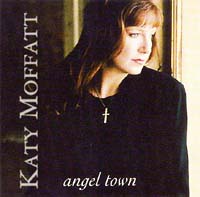 Katy Moffatt's gently tremulous voice makes an Emmylou Harris comparison natural. And when the one-time local plays the part, as she does on the first three tracks of Angel Town, she plays it well enough. But when Moffatt strays from standard folk and country fare, she goes from inert imitator to miscast pretender. Her supple voice is a terribly awkward fit to Chris Smithers' "Love Me Like a Man." And Moffatt overplays Cole Porter's "Miss Otis Regrets" with Chris Elliot-like artistry. It's on the three tunes Moffatt penned with Tom Russell -- "Jigsaw Love Affair," "The Game," and "Mother of Pearl" -- that she sounds most comfortable and natural, which make sense. Why rely on other people's material then? The resemblance to Harris may not be something that Moffatt can help (and, as that may be her best asset, why should she want to?), but she could do herself a world of good by spending more time in her own skin instead of trying to fit into others'.
Katy Moffatt's gently tremulous voice makes an Emmylou Harris comparison natural. And when the one-time local plays the part, as she does on the first three tracks of Angel Town, she plays it well enough. But when Moffatt strays from standard folk and country fare, she goes from inert imitator to miscast pretender. Her supple voice is a terribly awkward fit to Chris Smithers' "Love Me Like a Man." And Moffatt overplays Cole Porter's "Miss Otis Regrets" with Chris Elliot-like artistry. It's on the three tunes Moffatt penned with Tom Russell -- "Jigsaw Love Affair," "The Game," and "Mother of Pearl" -- that she sounds most comfortable and natural, which make sense. Why rely on other people's material then? The resemblance to Harris may not be something that Moffatt can help (and, as that may be her best asset, why should she want to?), but she could do herself a world of good by spending more time in her own skin instead of trying to fit into others'.
2 Stars --Michael Bertin
Floramay Holliday
(Roseneath)
Local songstress Floramay Holliday ain't afraid to tackle the big subjects, as the opening line from her self-titled debut makes clear: "We're all born, then we die/And in between that lies the Mystery." From there on out, Holliday spends the better part of the album plumbing the mysteries, from love to God to Labrador retrievers (mostly love and God). She's not too bent on solving those mysteries, mind you, but content to poke around in their shadows, finding meaning where it lies. For all that introspection, the first half of the album plays rather bland, a little short on images that stick, melodies that soar, or arrangements that crackle. Three chords and a nice enough voice; the standard singer-songwriter formula, but not enough to distinguish Holliday from the masses. Things get a little spicier in the second half, as she adds gospel, shuffles, and reels to the mix (there's even a good motorcycle ballad), proving that these songs can fly if given the chance. There's genuine promise here, but it comes a little too little and a little too late to make Floramay Holliday stand out from the crowd.
2 Stars --Jay Hardwig
Charlie Robison
Life of the Party (Lucky Dog/Sony)
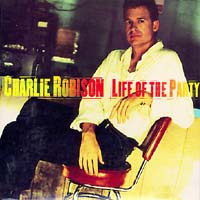 The lesser known of Bandera's Robison brothers, both on the same Sony Music Nashville imprint, Charlie Robison might just lay claim to being the more notable debut. Though not as well edited nor as expertly crafted as Wrapped, "little brother" Bruce's recent Lucky Dog debut, Life of the Party lands high on Austin's contemporary country music charts by virtue of Charlie's voice --- the one doing the singing, and the one in the songs. A classic cowhand drawl, Charlie Robison's voice is a welcome greeting; the type of voice that makes you look up from the bar. Confident, cocky even, it borders on redneck ("Poor Man's Son") without losing the heart the ladies twitter over ("Loving County"). Like his blonde boy good looks, Robison's voice camouflages some fundamental deficiencies in the whole bargain -- too many songs come off by rote ("Don't Call Me a Fool," "I Don't Feel That Way," "Waiting for the Mail") -- but then an instant honky-tonk anthem like the locally well-covered "Barlight," or the noble, Robert Earl Keenish "My Hometown" makes one forget all that in a hurry. So does the Lloyd Maines' impeccable production. Bruce may have the songwriting skills, but Charlie has the voice to sing 'em, the face to front 'em, and the swagger to make Nashville and all points South sit up and take notice.
The lesser known of Bandera's Robison brothers, both on the same Sony Music Nashville imprint, Charlie Robison might just lay claim to being the more notable debut. Though not as well edited nor as expertly crafted as Wrapped, "little brother" Bruce's recent Lucky Dog debut, Life of the Party lands high on Austin's contemporary country music charts by virtue of Charlie's voice --- the one doing the singing, and the one in the songs. A classic cowhand drawl, Charlie Robison's voice is a welcome greeting; the type of voice that makes you look up from the bar. Confident, cocky even, it borders on redneck ("Poor Man's Son") without losing the heart the ladies twitter over ("Loving County"). Like his blonde boy good looks, Robison's voice camouflages some fundamental deficiencies in the whole bargain -- too many songs come off by rote ("Don't Call Me a Fool," "I Don't Feel That Way," "Waiting for the Mail") -- but then an instant honky-tonk anthem like the locally well-covered "Barlight," or the noble, Robert Earl Keenish "My Hometown" makes one forget all that in a hurry. So does the Lloyd Maines' impeccable production. Bruce may have the songwriting skills, but Charlie has the voice to sing 'em, the face to front 'em, and the swagger to make Nashville and all points South sit up and take notice.
2.5 Stars --Raoul Hernandez
Copyright © 2024 Austin Chronicle Corporation. All rights reserved.
